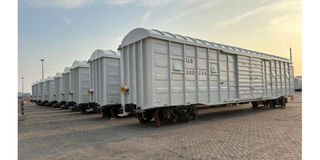WFP lauds Tanzania’s transport reforms, cites $93 million injection into local economy

What you need to know:
- In 2024 alone, WFP facilitated the movement of 220,000 metric tonnes of food commodities across the country, injecting $93 million into Tanzania’s local economy. Of that amount, 42 percent supported transport and logistics services, while 60 percent went towards local procurement of key staples like maize, sorghum, and beans.
Dar es Salaam. The United Nations World Food Programme (WFP) has commended the Tanzanian government’s ongoing investments in transport and logistics infrastructure, including the launch of freight train services via the Standard Gauge Railway (SGR) and the inauguration of the Kwala Inland Dry Port.
Speaking during the official launch of Kwala Inland Dry Port on Tuesday, WFP’s Country Director for Tanzania, Mr Ronald Tran, said the developments mark a critical step toward modernising transport systems, decongesting the Port of Dar es Salaam, and strengthening cargo flow to inland and neighbouring countries.
“This development is a key step in the Government’s efforts to modernise the transport infrastructure, improve cargo flow, and better serve the region,” said Mr Tran. “The WFP is proud to be a long-standing partner of the Government of Tanzania in the movement of humanitarian and food assistance, both within the country and across borders.”
He noted that WFP’s logistical operations extend across Tanzania and serve landlocked nations such as the Democratic Republic of Congo (DRC), Burundi, Rwanda, Uganda, South Sudan, Kenya, Malawi, and Zambia.
Tracing the collaboration back to 2019, Mr Tran highlighted a Memorandum of Understanding between WFP and the Tanzania Railway Corporation (TRC), under which WFP invested $500,000 to refurbish 40 freight wagons. That investment significantly enhanced TRC’s operational capacity along the Central Corridor, particularly for transporting food and humanitarian cargo.
“Between 2024 and 2025, WFP moved more than 10,000 metric tonnes of cargo using the railway — achieving a 37 percent reduction in costs and emissions compared to road transport, and injecting $600,000 into the local rail industry,” said Mr Tran.
Despite this representing just 8 percent of WFP’s total transport volume, he said the potential for scale was significant, especially given recent improvements in infrastructure and capacity.
In 2024 alone, WFP facilitated the movement of 220,000 metric tonnes of food commodities across the country, injecting $93 million into Tanzania’s local economy. Of that amount, 42 percent supported transport and logistics services, while 60 percent went towards local procurement of key staples like maize, sorghum, and beans.
“These efforts reflect the growing strength and competitiveness of Tanzania’s supply chain system, thanks to critical support from TRC, TPA, the Tanzania Bureau of Standards, Tanzania Shipping Agencies Company Limited (TASAC), the National Food Reserve Agency, and other partners,” he said.
Mr Tran also outlined the progress of the Rail Cold Chain Project, a joint initiative launched in 2022 between WFP and TRC, designed to link horticultural production zones in central Tanzania with local markets and major export ports.
To support the initiative, WFP has invested an additional $500,000 in feasibility studies, assessments, and equipment procurement — including refrigerated containers, crates, pallets, and heavy-duty machinery, all now handed over to TRC and fully operational.
“This project is already enabling smallholder farmers, women, and youth — including those with disabilities — to access markets and ensure the delivery of fresh, nutritious food at competitive prices,” said Mr Tran.
He further noted that the WFP would continue working closely with TRC, local governments, and the private sector to scale up the cold chain programme through complementary projects such as the Youth Agribusiness Initiative and Climate-Smart Agriculture Programmes, active in regions like Dodoma, Singida, Iringa, Manyara, Tabora, Shinyanga, Simiyu, and Lindi.
Mr Tran extended his appreciation to the Ministry of Transport and the Tanzania Port Authority for their collaboration, particularly highlighting the provision of a dedicated warehouse at the Port of Dar es Salaam — a facility WFP has used consistently since the early 2000s.
“Its strategic location and reliable performance have made Tanzania an attractive corridor for regional cargo movement,” he said. “Let us carry forward the spirit of collaboration and innovation that brought us here today. Together, we can build a more resilient, efficient and inclusive logistics ecosystem — one that supports not just humanitarian operations, but long-term





